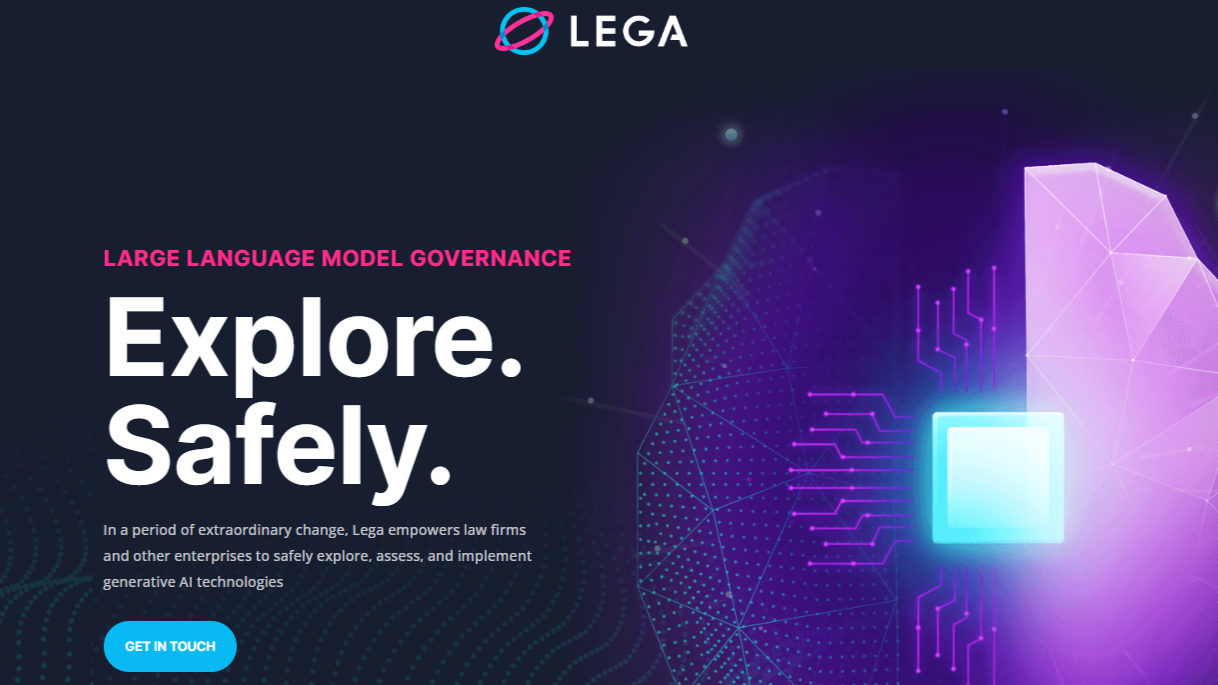This week’s news of the lawyers whose reliance on ChatGPT led them to file fabricated cases in federal court only underscores the fact that it sometimes feels like the Wild West out there as generative AI gallops onto the legal landscape. For law firms — indeed, for any organization — that poses the challenge of how to safely explore the technology of large language models and enforce adherence with internal governance policies.
Aiming to solve precisely that problem is a platform making its formal debut today, Lega, founded and led by the former president and COO of Reynen Court, Christian Lang, and with two prominent legal technology leaders as advisors, Haley Altman, former global head of corporate development at Litera, and Nicole Bradick, founder of the legal technology design and development company Theory and Principle.
“The future of the legal industry belongs to those who can successfully combine deep judgment-based expertise with the unparalleled force accelerator of generative AI,” Lang said in announcing the launch. “Our platform empowers law firms to begin their transformation journey immediately and securely — without exorbitant investments in technology or personnel.”
The company is launching with at least one AmLaw 100 law firm already a customer — Womble Bond Dickinson. Bill Koch, the firm’s chief knowledge and innovation officer, said that Lega provides “the enterprise guardrails we need to feel safe exploring LLMs and their use cases,” and that “it provides a powerful set of tools to both capture critical learning about where our professionals are inspired to use these tools and then to quickly scale the lessons learned throughout the enterprise so all of our users can benefit from breakthroughs.”
According to the announcement, the Lega platform is designed to provide law firms and enterprises with a secure and efficient way to explore, assess, and implement generative AI. Specifically, it allows them to:
- Safely explore different LLMs through a single enterprise platform.
- Build and configure API-driven solutions in a few clicks.
- Ensure secure solution access across the organization via Single Sign-On (SSO).
- Enforce policy adherence with real-time compliance checkpoints.
- Analyze usage across different solutions and LLMs via a single, comprehensive audit trail.
Lega also today announced a partnership with Betty Blocks, a no-code application development platform used by many customers in the legal industry, that will allow customers of both products to use Lega’s SaaS tools on Betty Blocks’ secure application hosting environment.
Elegant Governance Layer
In an interview yesterday, Lang said that he was inspired to start the company in January after thinking about the governance implications of so many lawyers playing around with ChatGPT and other LLMs outside the visibility of their firms.
It occurred to him that there was a need for someone to build “an elegant governance layer” so that when people want to consume these models through APIs, they could configure solutions through a platform experience.
“And then you could essentially manage users’ compliance checkpoints and audit logs of everything going in and everything coming out, all in one place, and outside of the application layer.”
Soon he had developed a prototype and within three months he had deployed it to Womble, his first Am Law 100 customer.
“You give the innovation teams the ability to build and configure solutions using their own APIs that they bring, where they can set up interesting tools and solutions across a bunch of different models — OpenAI next to Bard next to Claude next to whatever — in that interface.
“And then you have the ability, now that you’re controlling that traffic, to take everything that’s going in and everything that’s coming out and put it in an audit log that you can analyze. And that’s really important on day one to ensure compliance and governance.”
The platform uses SSO so that firms and users can manage access with the same sign-on as for their other technology. To ensure policy compliance, the platform requires users to acknowledge the policy at every sign-on.
“At its simplest level, we’re really just trying to help firms operationalize those policies, verify that they’re being adhered to, help them gain some learning about what their users are trying to do and help them scale that learning,” Lang said.
Targeting Law Firms
Lang says there is nothing “law firm specific” about the platform and that it could potentially be used by other types of enterprises. But he intends to focus on law firms for now, in part because that is the market he knows best, and in part because “the challenge we’re addressing is particularly acute in the legal industry.”
“When law firms get this right, they’re the ones who are going to be turning around and advising all of the other corporates and enterprises about how to solve this challenge, right. So there’s a really interesting and compelling reason why it might make sense to try to solve this for legal before we pivot more broadly.”
Lang, a former Davis Polk & Wardwell associate and the founder of Inspire.Legal, a legal innovation conference, became president and COO of Reynen Court in September 2022, after having been its head of strategy.
Two months later, the so-called app store of law began reducing its headcount and cutting back operations, and Lang left his position in January.
Reynen Court’s mission was to provide a platform on which law firms and legal departments could test, adopt and manage modern cloud-based applications without fear of compromising sensitive firm data.
Insofar as Lega’s mission is to provide a platform for firms and legal departments to safely explore and implement LLMs, I asked Lang if Lega is the Reynen Court of generative AI.
He sees Lega as much different. Whereas Reynen Court focused primarily on the application layer and on enabling users to deploy various applications, Lega is focused on the platform layer as a means of ensuring compliance and governance.
He said that he likes to think of it the way a woman at a law firm responded to him when he described it to her.
“She was like, ‘So this sounds like this basically gives me kind of a safe space to try and explore these models because you put some very basic enterprise guardrails around it so that we can get people out of consumer accounts and into kind of enterprise accounts.”
“I think that is a great way to think about it,” Lang said.
 Robert Ambrogi Blog
Robert Ambrogi Blog
